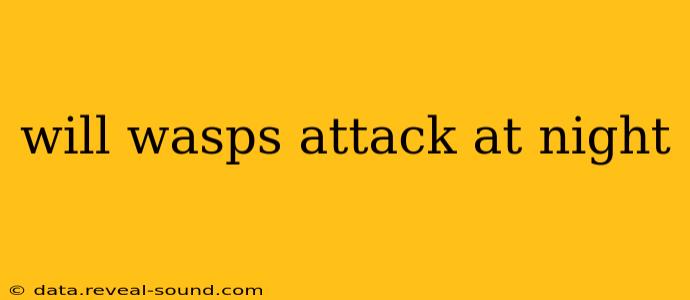Will Wasps Attack at Night? Understanding Nocturnal Wasp Behavior
The simple answer is: yes, some wasps can and will attack at night, though it's less common than daytime attacks. Understanding why requires a look at the different types of wasps and their nocturnal behaviors.
Most wasps are diurnal, meaning they are active during the day. Their primary activities, such as foraging for food and building nests, are heavily reliant on sunlight. However, some species exhibit varying degrees of nocturnal activity, and their likelihood of attacking at night depends on several factors.
What Kind of Wasps Are Nocturnal?
Not all wasp species are created equal. While the familiar yellow jackets and paper wasps are largely diurnal, certain species, particularly some solitary wasps, are more active at night. These nocturnal wasps often have adaptations that allow them to navigate and hunt in low-light conditions. For example, some have enhanced senses of smell or hearing.
Why Would a Wasp Attack at Night?
A wasp's primary motivation for attacking is self-defense or the defense of its nest. A nighttime attack might occur if:
- You disturb their nest: If you accidentally stumble upon a wasp nest at night (perhaps while using outdoor lighting), the wasps will likely feel threatened and defend their home, leading to stings. This is true whether it's day or night.
- Attracted to light sources: Some nocturnal insects, which serve as prey for some wasp species, are drawn to artificial lights. Wasps hunting these insects might therefore be more likely to be encountered near lights at night.
- Individual aggression: While less frequent, an aggressive individual wasp might attack even without a nest to defend.
Are Nighttime Wasp Attacks More Dangerous?
While the frequency of nighttime attacks is lower, the potential danger isn't necessarily greater or lesser than a daytime attack. The severity of a sting depends on the species of wasp and the individual's allergic reaction, not the time of day.
How to Avoid Wasp Attacks at Night
Taking precautions at night can significantly reduce the risk of wasp encounters:
- Avoid outdoor lighting: Limit the use of bright outdoor lights, especially near areas where wasps might nest, such as bushes, trees, or eaves.
- Be cautious near potential nesting sites: If you need to be outdoors at night, be mindful of potential wasp nesting areas.
- Keep food and drinks covered: Leaving food and sugary drinks uncovered at night can attract insects, and consequently, the wasps that prey on them.
- Wear protective clothing: If working outdoors at night in areas with a high probability of wasp activity, wear long sleeves, long pants, and closed-toe shoes.
What to Do If You Are Attacked by a Wasp at Night?
The response to a wasp sting remains the same whether it occurs at night or during the day:
- Remove the stinger (if present): Quickly scrape away any stinger using a credit card or your fingernail. Don't squeeze it, as this can release more venom.
- Clean the wound: Wash the area with soap and water.
- Apply a cold compress: This can help reduce swelling and pain.
- Monitor for allergic reactions: Seek immediate medical attention if you experience symptoms such as difficulty breathing, swelling of the face or throat, dizziness, or hives.
In conclusion, while less frequent, wasp attacks at night are possible, mainly due to nest defense or attraction to light sources. Understanding wasp behavior and taking appropriate precautions can significantly minimize your risk. Remember, prevention is always the best defense!
